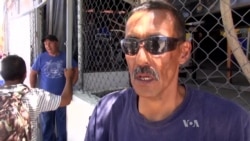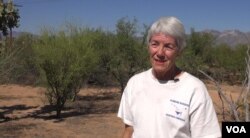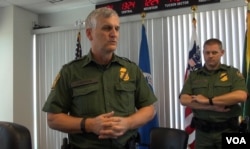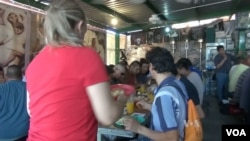It is relatively easy for migrants to cross the border in the remote areas of the Sonoran Desert, but then they face arid desolation. The desert, which straddles the U.S.-Mexico border, is a rocky, dry and mostly desolate area, especially on the north side of the border. In summer months, temperatures can exceed 40 degrees Centigrade.
But thousands of people trudge across this desert every year. Some carry drugs or other contraband, but most come seeking jobs that pay much more than what they could earn at home, even if they were able to get a job there. For Central Americans making the trek, whose numbers have increased in recent years, there is also the fear of violence from ruthless criminal gangs that plague large parts of Honduras, El Salvador and Guatemala.
Some Americans are torn by the immigration question, recognizing the absolute need for a nation to control its borders and maintain the rule of law, but also having sympathy for the poor people who risk their lives crossing an inhospitable landscape to seek a better life.
Opponents say undocumented workers create unemployment for American workers, drive down wages, put a burden on schools, hospitals and other social services and undermine the system for legal immigration.
Arizona voters have supported measures to curb illegal border crossings. In April, 2010, Arizona Governor Janet Brewer signed a state law that required police to check the immigration status of anyone they stopped. Less than three months later a federal court blocked the most controversial aspects of the law, but, now out of office, Brewer remains a strong opponent to illegal immigration, saying recently, "Our borders need to be secured and we believe in the rule of law." The most outspoken public figure in Arizona is Maricopa County Sheriff Joe Arpaio, who spoke in favor of Trump's proposed border wall at last week's Republican Convention.
Tucson resident Diane Hoelter has been a volunteer with the humanitarian group Humane Borders for the past seven years and has become familiar with the plight of migrants who are ill-prepared for the desert.
“A lot of times they do not have the appropriate foot gear they should have,” she said. “Then they get blisters and so on. It is very bad. But the main thing would be the dehydration.”
Humane Borders places water tanks in various parts of the Arizona desert flying a flag above to alert migrants. It helps some, but many people crossing the border don’t know about these water stations, and the flags can be difficult to spot from a distance in the rocky and uneven ground.
Migrants who cannot keep up with the main group being led by a smuggler, usually at night, can get lost and find themselves in dire straits when the morning sun bears down on them. One female migrant who spoke to VOA said, “With this heat and the dehydration, I have heard of people being left behind in the middle of the trail.”
At that point their best hope of survival is rescue -- and arrest -- by the U.S. Border Patrol.
Border patrol challenged by terrain
A special unit of Border Patrol called BORSTAR (Border Patrol Search, Trauma, Rescue) seeks migrants in trouble and gives them water and first aid, if needed. But members of the unit are still law enforcement agents and are required to take the migrants to a detention center. If the migrants are first-time offenders, they will generally be released back across the border very quickly, but repeat offenders sometimes are kept locked up for weeks.
Paul Beeson, chief of the Border Patrol’s Tucson Sector, understands the push and pull factors that drive people to cross the border without documents. But, he told VOA, he and his agents do not make policy, they enforce the law.
“People are constantly trying to cross this border,” he said. “That is why we are here; we are here to prevent them from doing that to the best of our ability.”
Beeson said the terrain that impedes their ability to stop all illegal crossers can also prevent them from saving people in need of help.
“This is a very rugged environment that we have here in the Tucson Sector,” he said. “There are seven mountain ranges that bisect the border, that impact our ability to move laterally, east and west.”
Aid for migrants in Mexico
In Mexico, the government provides some services to migrants through a unit called Grupo Beta. It is an agency of the Mexican federal government’s Mexican Migration Institute and its uniformed agents work to stop smuggling and crimes against immigrants.
Mexican authorities cooperate with private charitable groups that offer other services to migrants, such as basic medical assistance, food and clothing.
The Kino Border Initiative, started by Catholic priests with cooperation from groups on both sides of the border, provides dozens of deported migrants with a hearty breakfast every day. Nuns assisting with the program also warn the migrants of the risks they face.
Sean Carroll, a Jesuit priest who serves as the organization's executive director, says the basic focus is on providing humanitarian assistance and informing the migrants of risks.
“If they cross again, they run the risk of being in detention for a number of days,” he said, “and the risks of the desert itself, being assaulted or robbed or even dying in the desert.”
But many of these people are driven by poverty and, especially in the case of Central Americans, by fear of violence in their home nations. They say they have little choice but to try again and again.








